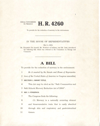Student Success Stories
Students in Georgetown University’s Program on Science in the Public Interest take their own ideas to Congress. They get results and they shape their careers:
- SPI students went live on a syndicated sports radio talk show to encourage Congress to support steroid testing of high school athletes. They promoted their issue in meetings with two Members of Congress and staff in six more congressional offices and Senator Nelson introduced the “Drug Free Varsity Sports Act” to provide states with funding to test high school athletes.
- SPI students advocated for a “green campuses” initiative to support universities and colleges that build green buildings and they got their proposal into Senator Bingaman’s “Energy Efficiency Act.”
- An SPI student group received the national James Randi Education Foundation Award.
- An SPI student was awarded a prestigious Presidential Management Fellowship.
- SPI graduates go on study at leading medical schools and research universities and work in Congress including on the Ways & Means Committee, Science Committee and in Senate and House offices. One student became an elected Councilman in New Jersey.
- 98% of SPI students graduate with their science degree. By contrast, the New York Times reports that more than half the nation’s college students drop out of science before graduating.
More Student Projects:
Mass Transportation in Mali
Four Georgetown students traveled to Mali over spring break to meet with government officials about implementing a new public transportation system in the capital city of Bamako.
Among the team were Mathematics major Anthony Conyers (C’12) and Biology and Government double major Michael Barclay (C’12), who pitched the project as an assignment for their class on “Science and Society: Global Challenges.” The course is part of the College’s Program on Science in the Public Interest (SPI), which asks students to take their knowledge beyond the classroom by building projects that could be implemented as public policy or lead to positive social change. Working with classmates Joseph Luk (SFS’11) and Sean Quigley (SFS’12), Conyers and Barclay created a plan to lower worldwide energy consumption, and then received a grant that helped them travel to Africa to begin their field research.
Shaping National Science
Clean Technology
Wheat Rust
“SIMPL”

A group of five students taking the seminar “Shaping National Science Policy” were concerned about the risks associated with mercury spills. In particular, the vast majority of high schools in the United States were using mercury thermometers in science labs. The students – Christopher Harvey, Stephen Varney, Mehrak Marzban, Caitlin Clark, and Christopher Trueblood – calling themselves SIMPL “Students for Informed Mercury Policy Legislation”, developed an advocacy campaign to establish a federal program that would allow any high school to exchange its mercury thermometers with alcohol thermometers. They proposed their idea in a meeting with Senator Olympia Snowe, and then went on to promote the idea to several Members of the House of Representatives. They enlisted the support of local PTAs and the National Science Teachers Association. Within three months they had successfully advocated for their cause and Representative Tammy Baldwin introduced bill HR 4260, the “Safe Communities and Safe Schools Mercury Reduction Act” establishing a federal thermometer exchange program.
The Million-Dollar “Vitamin O” Scam

A group of four students taking the seminar “Shaping National Science Policy” examined a widely selling dietary supplement, “Vitamin O”, and determined that is was nothing more than salt water. The two companies marketing the supplement were selling it for $10 an ounce and claiming in ads that appeared in USA Today that “Vitamin O” could cure or prevent cancer. The students crafted a compelling campaign to alert the media and Members of Congress of the scam. National Public Radio aired a story, Vitamin O was exposed as a scam, and the FTC filed a suit against the two companies. (Read the FTC judgement. (new window)) In recognition of their work, the students – Maggie Czarnogorski, Leslie Lousteau, Irena Politzer and Emma Salustro – received the national James Randi Education Foundation Award.
Nursing Shortage: Phoning in the Problem

Five students taking the seminar “Shaping National Science Policy” – Nicole Alston, Jonathan Nepomuceno, Shanika Whitehurst and Winnie Felix – were concerned about a looming national nursing shortage. To address the problem, they believed that Congress should establish a federal loan forgiveness program as an incentive to encourage students to pursue a career in nursing. There was a bill already in Congress, “HR 1306”, but staff working for the Member who introduced the bill told the students that the bill was “dead” – it had been introduced, received limited attention, then dropped. The students developed a strategic campaign of visits with congressional staff coupled to campus based phone bank that generated more than 200 calls from constituents to their Members of Congress. The students resuscitated the bill by adding 20 new co-sponsors and reviving the discussion in Congress.
Responding to the death of GU student Daniel Rigby

Five students taking the seminar “Shaping National Science Policy” were deeply concerned by the tragic death of Georgetown University student Daniel Rigby in an off-campus fire. They wanted to ensure that every student in the country had the ability to contact a local fire chief and request an inspection. The students – Adam Raff, Caroline Murphy, Ann Bobel, Panpan Wang and Philip Lehman – conceived of an on-line service that could be overseen by the Federal Emergency Management Agency. They successfully promoted their idea to staff in the offices of Senators Domenici and Santorum and the two Senators signed and sent a letter to the director of the Department of Homeland Security calling for the creation of the web-accessible service the students were advocating.
